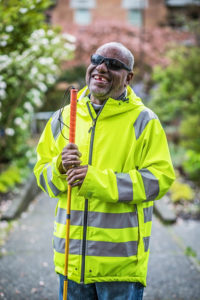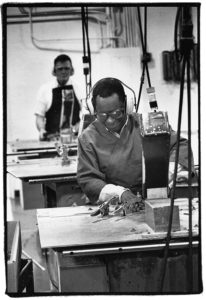Quincy Daniels
Texas Teen Enjoys Lighthouse Career
By Linda Norlen

Quincy Daniels came to the Lighthouse in 1968 when he was 17 years old, shortly after moving from Texas with his mother and sister. At that time, he says, the Lighthouse building was only two floors and had significantly fewer employees. Throughout the 70’s and 80’s, Quincy would leave and return to the Lighthouse for various reasons. First, he went back to Texas for two years to take on a manufacturing job. After those two years, Quincy found himself returning back to the Seattle Lighthouse, where he stayed for another five years. At one point, Quincy was laid off from the Lighthouse for a few years but ultimately returned in 1983 and has been working here ever since.
Quincy spent his first two years in the mop shop, but then decided he wanted to learn the machine shop: how to work drill presses, profile mills, and table saws.

Back then, he remembers how there were no setups who were blind; a sighted person set up each machine. Though Quincy is still a machine operator today, he now runs a high-tech CNC (computer numerical control) machine that has been outfitted to be blind friendly. Each machine mills a separate part for The Boeing Company—just one of many changes to the shop over the years.
Quincy knows quite a few of the people who work at the Lighthouse now. “I meet everybody,” he says. Of the many friends he’s made here, Quincy especially remembers one man who became an early role model when he arrived as a teenager. Percy Adams was an outstanding worker, Quincy says, someone who “had a good attitude and a good way about himself.” Though Percy was probably 20 years older than Quincy, they quickly became friends. Quincy got to spend time with Percy and his family outside of work, and later visited Percy when he grew sick.
Quincy is a fan of all kinds of sports, football, baseball, and basketball, but his favorite activity is singing. “I sing all over the place,” he says, in church choirs and in talent shows for the blind. He used to sing in a group and once sang for former Lighthouse President and CEO, George Jacobson.
“It’s a challenge to be here for so many years,” Quincy says, “but the Lighthouse does give you room to grow. I wanted to learn the machines—and I did.” He thinks he’s likely to retire in the next year or two, but feels it’s important to be part of the Lighthouse family as they celebrate their 100thyear.